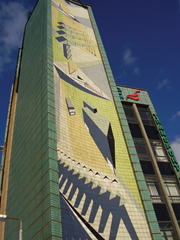NIPSA
 A new series on Northern Ireland’s unions.
A new series on Northern Ireland’s unions.
Northern Ireland Public Service Alliance (NIPSA)
NIPSA is Northern Ireland’s largest trade union and one of four based in the province. Members’ jobs, in its words, vary from “architects to zoologist”, and as the name suggests, the union draws its membership mainly from the public sector.
Northern Ireland Civil Service staff make up 47 per cent of members. After justice devolution, membership from the NIO and other UK Government departments is negligible. The wider public sector accounts for 51 per cent, while the remaining 2 per cent come from the voluntary and community sector.
Its headquarters is Harkin House in South Belfast, named after co-founder Brendan Harkin. The union is sub-divided into two groups: the Civil Service Group and the Public Officers Group, each having separate annual conferences. Members then combine at the main NIPSA conference. A 25-strong general council leads the union between the conferences and there are 193 branches.
NIPSA’s main predecessor was the Ulster Public Officers Association, which dissolved in 1974. Its two replacements (the Health and Social Services Board Division and the Public Officers Division) were amalgamated with two other unions (the Civil Service Professional Officers Association and the Northern Ireland Civil Service Association) to form NIPSA in the same year.
“First and foremost the main priority of NIPSA is to protect the jobs and pay levels of members especially in the current ideologically driven austerity environment,” says General Secretary Brian Campfield, who succeeded John Corey in October 2009. The union sees defending the welfare state and protecting “high quality” public services as “inextricably linked” to that aim.
Cuts motivate its two campaigns.
‘Tax Gap’ demands that the UK Government cracks down on tax evasion and avoidance. More tax revenue would make public spending cuts unnecessary. Unpaid taxes total £120 billion per annum, according to unions, based on the TUC- commissioned ‘Missing Billions’ report. HMRC says the sum was £42 billion for 2008-2009.
The ‘Public Services Defence Campaign’ focuses on the consequences and involves marches, rallies and demonstrations, lobbying and publicity. Practical examples include opposing the closure of Belfast libraries and job losses at Belfast Metropolitan College, where it works alongside the University and College Union.
On a wider level, NIPSA supports a boycott of Israeli goods due to the occupation of Palestinian territory. It also backs better workers’ rights in the clothes industry and justice for murdered trade unionists in Colombia. “These campaigns are mainstream trade union campaigns supported by most trade unions in Britain and Ireland,” explained Campfield. The union’s Developing World Fund supports self-help and education projects overseas.
As with the other Northern Ireland-based unions, NIPSA has no political fund. It is affiliated to the Irish Congress of Trade Unions (ICTU), the European Federation of Public Service Unions (EPSU) and Public Services International (PSI).
Subscriptions in 2009 stood at £3.949 million with a total income of £3.97 million. Total expenditure was £6.181 million, which includes a one- off charge for pension provision, and the union’s funds were £1.628 million at the end of the year.
NIPSA in brief
President: Maria Morgan
General Secretary: Brian Campfield
Members (2009): 46,150
Website: www.nipsa.org.uk





